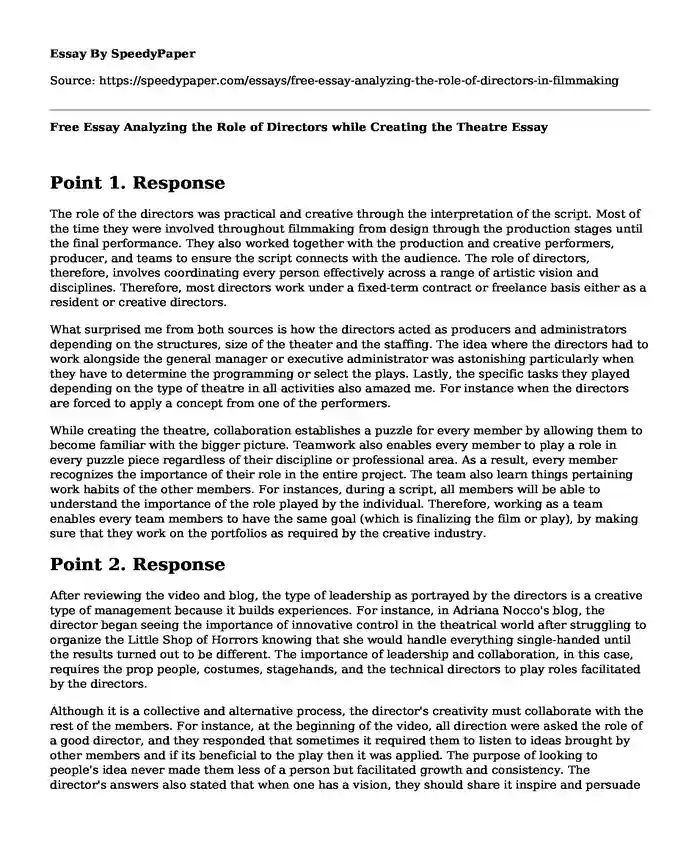
| Type of paper: | Course work |
| Categories: | Theatre Leadership style |
| Pages: | 3 |
| Wordcount: | 659 words |
Point 1. Response
The role of the directors was practical and creative through the interpretation of the script. Most of the time they were involved throughout filmmaking from design through the production stages until the final performance. They also worked together with the production and creative performers, producer, and teams to ensure the script connects with the audience. The role of directors, therefore, involves coordinating every person effectively across a range of artistic vision and disciplines. Therefore, most directors work under a fixed-term contract or freelance basis either as a resident or creative directors.
What surprised me from both sources is how the directors acted as producers and administrators depending on the structures, size of the theater and the staffing. The idea where the directors had to work alongside the general manager or executive administrator was astonishing particularly when they have to determine the programming or select the plays. Lastly, the specific tasks they played depending on the type of theatre in all activities also amazed me. For instance when the directors are forced to apply a concept from one of the performers.
While creating the theatre, collaboration establishes a puzzle for every member by allowing them to become familiar with the bigger picture. Teamwork also enables every member to play a role in every puzzle piece regardless of their discipline or professional area. As a result, every member recognizes the importance of their role in the entire project. The team also learn things pertaining work habits of the other members. For instances, during a script, all members will be able to understand the importance of the role played by the individual. Therefore, working as a team enables every team members to have the same goal (which is finalizing the film or play), by making sure that they work on the portfolios as required by the creative industry.
Point 2. Response
After reviewing the video and blog, the type of leadership as portrayed by the directors is a creative type of management because it builds experiences. For instance, in Adriana Nocco's blog, the director began seeing the importance of innovative control in the theatrical world after struggling to organize the Little Shop of Horrors knowing that she would handle everything single-handed until the results turned out to be different. The importance of leadership and collaboration, in this case, requires the prop people, costumes, stagehands, and the technical directors to play roles facilitated by the directors.
Although it is a collective and alternative process, the director's creativity must collaborate with the rest of the members. For instance, at the beginning of the video, all direction were asked the role of a good director, and they responded that sometimes it required them to listen to ideas brought by other members and if its beneficial to the play then it was applied. The purpose of looking to people's idea never made them less of a person but facilitated growth and consistency. The director's answers also stated that when one has a vision, they should share it inspire and persuade the team members.
This way they will manage to set clear instructions on the requirements of the play including knowing how to say no to ideas that do not fit in the act. It is a collective and iterative process required to be followed by a creative leader to cultivate and direct the other members to ensure that the final. One thing learned is that for this to be achieved, the directors in the video also added that communication is vital if they wanted to display the vision of what they want to make. If one does not manage to communicate then the collaborative process required in filmmaking will not be active throughout the process.
References
Directors: Process & Collaboration (Working In The Theatre #410) (2012, April 02). Retrieved October 12, 2018, from https://www.youtube.com/watch?v=-x-4S9IN9QE
Nocco, A. (2015, July 28). Theatrical "Authorship": Collaboration is Key. Retrieved from https://www.onstageblog.com/columns/2015/7/28/theatrical-authorship-collaboration-is-key
Cite this page
Free Essay Analyzing the Role of Directors while Creating the Theatre. (2022, Sep 01). Retrieved from https://speedypaper.com/essays/free-essay-analyzing-the-role-of-directors-in-filmmaking
Request Removal
If you are the original author of this essay and no longer wish to have it published on the SpeedyPaper website, please click below to request its removal:
- Groundwater Modeling, Free Essay Sample
- Personal Statement Sample in a Free Essay
- Medical Organizations Essay Sample
- Chiquita, Free Essay with the Article Summary
- Free Essay: The Place of Greed in Suffering: A Critical View of the Versatile Madame Loisel
- Essay Example: Conjoint Analysis, Cluster Analysis, and Multidimensional Scaling
- Free Essay Example - Co-Cultures
Popular categories




